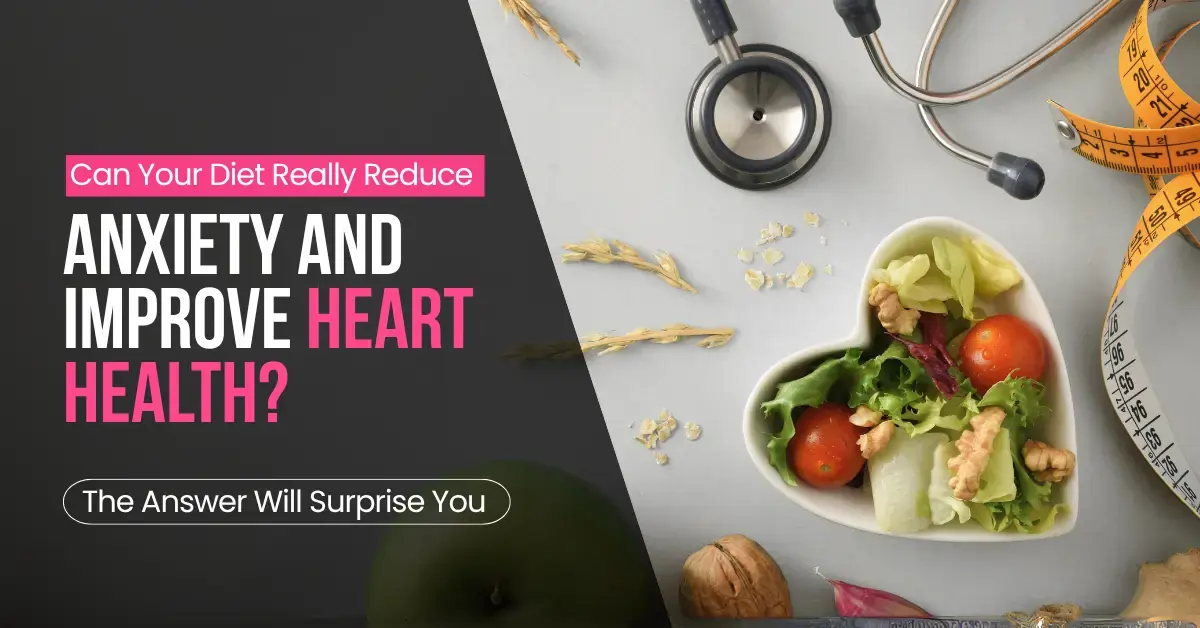Are you struggling with anxiety and wondering how diet can help? A diet to reduce anxiety is not just a fad but a powerful tool. Certain foods can support mental health, regulate mood, and help you manage stress, contributing to a calmer, more focused lifestyle. If you’ve been feeling anxious, overwhelmed, or even dealing with sudden heart palpitations, you’re not alone. Today, many Indian women in their 30s and 40s report symptoms like racing thoughts, emotional ups and downs, and even irregular heartbeat.
What’s surprising is how much your diet plays a role in both mental and heart health.
At Q-Slim Fitness Studio, we’ve seen first-hand how a mindful Indian diet can reduce anxiety and improve overall heart function. This blog will walk you through how that works, which foods can help, and what mistakes to avoid.
The Anxiety-Heart Connection Is Real
When you’re stressed or anxious, your body produces more cortisol and adrenaline. These stress hormones:
- Increase your blood pressure
- Make your heart beat faster
- Raise your blood sugar
Over time, this puts enormous pressure on your heart. What starts as a panic attack or sleepless night can evolve into chronic heart strain if not addressed. That’s why managing stress with food is not just a mental health goal — it’s a heart health priority too.
Common Diet Mistakes That Make Anxiety Worse
You might think you’re eating healthy, but some common habits could be feeding your anxiety and harming your heart:
- Skipping meals or long fasting windows
- Relying on black coffee or green tea too often
- Eating processed snacks high in sodium or sugar
- Consuming too little good fat
These habits keep your cortisol levels high. They also cause fluctuations in blood sugar, which leads to irritability, cravings, and a faster heart rate.
If you’re currently following a restrictive plan, read our blog on How Indian Women Can Boost Their Metabolism After 35 to learn how to eat without stress.
Indian Foods That Calm the Mind and Support the Heart
A traditional Indian diet has several powerful foods that naturally reduce anxiety and support cardiovascular health. Let’s look at a few you can include daily:
1. Moong Dal and Khichdi
Light, digestible, and rich in magnesium and B-vitamins. These nutrients support your nervous system and help regulate blood pressure.
2. A2 Ghee
Just 1 tsp of A2 ghee in your meals supports hormone balance and reduces gut inflammation, which directly impacts mood and heart function.
3. Pumpkin Seeds
Rich in zinc and tryptophan, they support serotonin production, which calms anxiety.
4. Banana
A natural source of potassium and B6. This fruit helps stabilize your blood pressure and promotes restful sleep.
5. Ashwagandha
A traditional adaptogen that reduces cortisol levels and supports a healthy heart rhythm. You can take it as a tea or capsule under expert guidance.
Your Gut is the Gatekeeper to Your Mood
Over 70% of serotonin, your feel-good hormone, is produced in the gut. So if your digestion is poor, you are more likely to experience anxiety, irritability, and emotional fatigue.
Try including:
- Homemade curd or buttermilk
- Fermented foods like kanji or idli
- Triphala churna for detox
You can also explore our Gut Health and Immunity Nutrition Services designed to reduce bloating, support happy hormones, and protect your heart.
Meal Plan Ideas for Calmer Moods and a Stronger Heart
Here’s a sample one-day meal plan to support both your emotional and heart health:
| Time | Meal |
| 7:30 AM | Warm water + soaked walnuts + 1 banana |
| 9:00 AM | Vegetable poha with curry leaves + mint chutney |
| 12:30 PM | Khichdi with ghee + sautéed lauki + cucumber raita |
| 4:00 PM | Herbal tea + roasted chana or foxnuts |
| 7:30 PM | Moong dal cheela + mint chutney + warm turmeric milk before bed |
Consistency is more important than complexity. When you eat timely, nourishing meals, your stress levels drop, digestion improves, and your heart rate stays calm.
Easy Lifestyle Habits to Pair With Your Diet
1. Breathe Deeply Before Meals
Just 3 minutes of deep breathing can help shift your body from “stress mode” to “digest mode,” supporting heart function and reducing anxiety.
2. Stop Eating in a Rush
Mindful eating gives your brain time to process satiety, stabilizes blood sugar, and lowers the chances of emotional overeating.
3. Limit Social Media Scrolling at Night
Late-night screen time raises adrenaline levels and interferes with melatonin, affecting both your mood and heart rhythm.
Final Words: Eat to Feel Safe, Not Just Slim
A peaceful mind and a healthy heart are deeply connected. And the bridge between them is your diet.
If you’re tired of diets that make you anxious or plans that leave you sleepless, it’s time to shift the focus. At Q-Slim Fitness Studio, we design plans that nourish your mind, heart, and body — without making you feel deprived.
Ready to feel calm, balanced, and strong? Visit our homepage to explore more or contact us for a personalized diet consultation.
FAQs
Q. Can diet really help reduce anxiety?
Yes. A well-balanced Indian diet with the right nutrients supports neurotransmitters that regulate your mood and stress response.
Q. What foods should I avoid during anxiety?
Avoid excess caffeine, processed sugar, and high-sodium snacks. These raise blood pressure and increase heart rate.
Q. How does poor digestion affect mental health?
A sluggish gut leads to inflammation and reduces serotonin production, which can worsen anxiety and fatigue.
Q. How soon can I see results from changing my diet?
Most people notice mood improvement and better sleep within 2 to 3 weeks of following a supportive meal plan.

